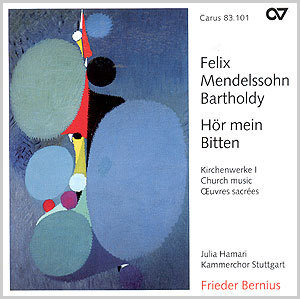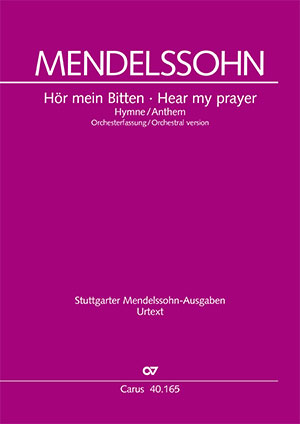
Hör mein Bitten. Kirchenwerke I (Bernius)
This CD traverses a spectrum from the 16-voice Hora est or the imposing Kyrie – both of which are early Mendelssohn works – to the later Magnificat and Canticum Simeonis. These later works are among the most expressive a cappella choral compositions of the Romantic era.
Purchase
Additional product information
Contents
-
Composer
Felix Mendelssohn Bartholdy
| 1809-1847
-
Preface writer
Friedhelm Krummacher
-
Choir
Kammerchor Stuttgart
The Kammerchor Stuttgart is regarded as one of the best ensembles of its kind. Over its fifty-year existence, Frieder Bernius has developed the choir into an exceptional ensemble acclaimed by audiences and press alike. This has led to invitations for the choir to perform at all the important European festivals. In Germany the chamber choir performs at festivals and in concert halls in repertoire ranging from the 17th to the 21st century. Frieder Bernius and his ensemble have received numerous accolades for their contribution to new music. The Kammerchor Stuttgart has made over 80 CDs and LPs, numerous of which have been awarded international recording prizes (including the Edison award, Diapason d’or, Gramophone Choice, Classical Internet Award, International Classical Music Award, and German Record Critics’ Award prizes). The International Federation for Choral Music has invited the ensemble to sing at the 1st, 4th and 10th World Symposia on Choral Music in Vienna, Sydney and Seoul. Regular tours of North America and Asia since 1988 and a South America tour reflect the Kammerchor Stuttgart’s international reputation. Since 1984 the top ensemble has also been invited to Israel biennially. Personal details
-
Ensemble
Ensemble '76 Stuttgart
The Ensemble Stuttgart (Ensemble '76) was founded by Wolfgang Rösch in 1976 and is made up of solo players, musicians from Stuttgart orchestras and music students. Its repertoire comprises pieces for chamber orchestra, including the Bach Brandenburg Concertos as well as symphonies by Haydn, Mozart and Schubert, and chamber music, including the sextets of Brahms and Tchaikovsky and the Mendelssohn Octet. In addition it plays contemporary pieces, some of which were written for this ensemble. The Ensemble Stuttgart gives concerts in Germany, France, Italy and Belgium, and has been involved in many CD and radio productions. Personal details
-
Conductor
Frieder Bernius
| 1947Frieder Bernius’s work has earned great worldwide recognition. He is in demand internationally as a conductor and as a teacher. His principal artistic collaborators are the ensembles he founded himself, the Kammerchor Stuttgart, the Barockorchester Stuttgart, the Hofkapelle Stuttgart and the Klassische Philharmonie Stuttgart. As a guest conductor, he has collaborated repeatedly with, for example, the SWR Vokalensemble Stuttgart, the Deutsche Kammerphilharmonie Bremen, the Stuttgarter Kammerorchester and the Streicherakademie Bozen. Great stylistic versatility is Frieder Bernius’s hallmark. Whether he conducts vocal works by Monteverdi, Bach, Händel, Mozart, Beethoven, Fauré and Ligeti, stage music by Mendelssohn or symphonies by Haydn, Burgmüller and Schubert, his work always aims for a sound that is at once unmistakably personal and at the same time oriented towards the original period sound ideal. He devotes himself equally to the rediscovery of 18th century operas and to first performances of contemporary compositions. He is particularly interested in the musical history of southwestern Germany. Carus-Verlag has awarded Frieder Bernius a Golden CD for his complete recording of the sacred music of Felix Mendelssohn Bartholdy. The award was presented to him during the German Choir Festival in Stuttgart 2016. The sale of over 250,000 recordings, which has been acclaimed with a number of awards, has made a not insignificant contribution to what today is the obvious presence of Mendelssohn's complete œuvre in the concert repertoire. Personal details
-
Soloist - mezzo-soprano
Julia Hamari
The contralto Julia Hamari was born in Budapest. She completed her education at the Budapest Music Academy with her diploma as a singer and vocal teacher. In 1964 she won the International Ferenc Erkel Singing Competition in Budapest. She continued her studies in Stuttgart in 1966-67. In 1966 she made her Vienna debut in J.S. Bach's St. Matthew Passion under Karl Richter; in the same year she sang Brahms's Alto Rhapsody in Rome under Vittorio Gui. This was the gateway to a brilliant career in the concert hall for the young artist. She performed all over the world with great success as an oratorio and Lieder singer, appearing under important conductors like Karajan, Celibidache, Kubelik, Solti, Böhm and Boulez. In 1972 she made her US debut in Chicago. Her sovereign command of vocal technique has enabled her to sing classical arias for coloratura contralto with particular success. Personal details
Frequent questions about this work
 There are no questions and answers available so far or you were unable to find an answer to your specific question about this work? Then click here and send your specific questions to our Customer Services!
There are no questions and answers available so far or you were unable to find an answer to your specific question about this work? Then click here and send your specific questions to our Customer Services!






